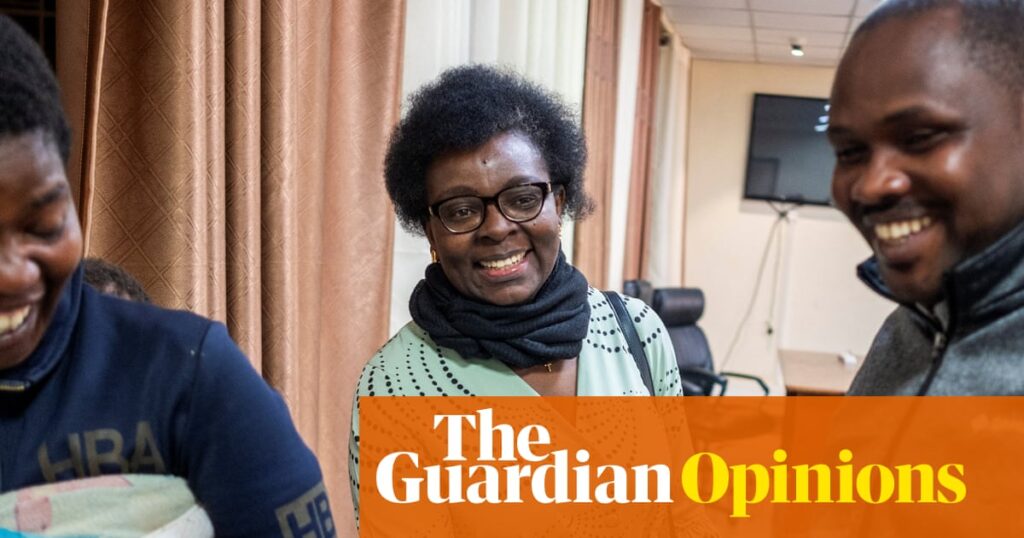When I see the “Visit Rwanda” logo stitched on to the jerseys of famous football clubs like Arsenal or printed in glossy travel magazines, I feel a rush of pride for the natural beauty and warm hospitality of the country of my birth. Yet, I wonder whether the tourists being courted truly understand the darker side of Rwanda. This side has torn my family apart for nearly two decades; it is the reason my mother sits behind bars, once again, as a political prisoner.
My mother, Victoire Ingabire Umuhoza, is a political activist who first returned to Rwanda from exile in 2010. Our family had a stable and comfortable life in the Netherlands for many years, but my mother could not stop thinking about her native Rwanda and was deeply troubled by the events unfolding there. The president, Paul Kagame, heralded as the man who stopped the 1994 genocide, was quietly becoming yet another strongman on the African continent. My mother could not silently watch from the sidelines in Europe as Rwanda’s citizens lost their freedoms and suffered persecution.
She eventually returned to Rwanda seeking to challenge Kagame and run for the presidency, but these plans were quickly thwarted. Shortly after her return in 2010, she was arrested and forced to face charges of genocide ideology and terrorism in a trial that was internationally condemned as unfair and a violation of her rights. She was sentenced to 15 years in prison.
My mother was in jail for eight years, much of that time in solitary confinement. When she received a presidential pardon in 2018 from President Kagame himself, we thought our family would finally have a chance to reunite. But even though she was no longer imprisoned, my mother was not free. She was prevented from running for elected office. To this day, her political party has not been allowed to officially register. The conditions of her pardon also required her to seek permission if she wanted to travel outside Rwanda, but despite her numerous requests, permission has never been granted.
My mother has missed every important moment and milestone in our family’s life since her return to Rwanda, from graduations, to weddings, to the birth of her grandchildren. She has not even been allowed to visit her husband, my father, who has faced severe health challenges that have left him paralysed and gravely ill.
The conditions of my mother’s pardon were set to expire in October of this year. We hoped and believed that this would mean she would have her freedoms and rights fully restored. When I visited her in Rwanda earlier this year – our first reunion in 15 years and the first time she has ever met my wife and children – we dared to plan to celebrate Christmas together. These hopes were dashed when she was arrested on 19 June 2025. She now faces vague and politically motivated charges, including conspiracy to overthrow the government and spreading false information. She is awaiting what will certainly be a political trial, like the one she went through in 2010.
Still, in many ways my mother is fortunate. She is alive. The same cannot be said for members of Dalfa Umurinzi, the political party she established. Since 2016, several members have gone missing, and others have been murdered. Their political activism ultimately cost them the highest price, and our mother has often told us this terrible injustice motivates her to keep going in her fight for democracy and respect for human rights.
The first time the Rwandan government imprisoned my mother, I was only a child, too young and scared to advocate for the mother I love and admire so deeply. But times have changed, and now I will use my voice whenever and however I can to draw attention to her unjust imprisonment and call for her freedom.
I ask democratic leaders and governments around the world to hold Rwanda accountable for violating the standards of international law. Since Kagame became its leader, Rwanda has styled itself as a commendable success story in Africa and a worthy player in the international community. There are too few who question why Kagame wins elections by 99% of the vote while arrests, disappearances and even killings of his critics occur both within and outside Rwanda’s borders. We need more governments to raise these questions and demand answers.
The country still depends heavily on overseas development assistance, so I join with those who argue that such aid should require Rwanda to ensure true democracy, liberty for all and justice according to the established rule of law.
My mother, Victoire, and many other courageous dissidents in Rwanda have risked their lives to speak out for these values. Now I ask the international community to speak out for them. Rwanda needs a consensus democracy, one that solves political problems through dialogue, to move toward a better future for all. But this is impossible as long as an authoritarian regime maintains control. Hope for the freedom of dissidents like my mother, and for all citizens of Rwanda, rests in diplomatic intervention, political pressure and the media’s role in uncovering the true nature of the regime in Rwanda.
-
Do you have an opinion on the issues raised in this article? If you would like to submit a response of up to 300 words by email to be considered for publication in our letters section, please click here.

